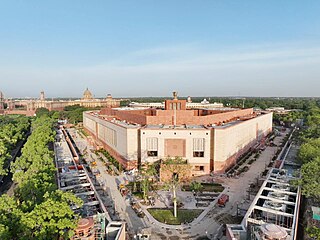Related Research Articles

The Rajya Sabha, also known as the Council of States, is the upper house of the bicameral Parliament of India. As of 2023, it has a maximum membership of 245, of which 233 are elected by the legislatures of the states and union territories using single transferable votes through open ballots, while the president can appoint 12 members for their contributions to art, literature, science, and social service. The total allowed capacity is 250 according to article 80 of the Indian Constitution. The current potential seating capacity of the Rajya Sabha is 245, after the Jammu and Kashmir (Reorganisation) Act. The maximum seats of 250 members can be filled up at the discretion and requirements of the house of Rajya Sabha.

The Lok Sabha, also known as the House of the People, is the lower house of India's bicameral Parliament, with the upper house being the Rajya Sabha. Members of the Lok Sabha are elected by an adult universal suffrage and a first-past-the-post system to represent their respective constituencies, and they hold their seats for five years or until the body is dissolved by the president on the advice of the council of ministers. The house meets in the Lok Sabha Chambers of the Parliament House, New Delhi.

The Parliament of India or Indian Parliament, is the supreme legislative body of the Republic of India. It is a bicameral legislature composed of the Rajya Sabha and the Lok Sabha. The president of the Republic of India, in their role as head of the legislature, has full powers to summon and prorogue either house of Parliament or to dissolve the Lok Sabha, but they can exercise these powers only upon the advice of the prime minister and the Union Council of Ministers.

Shankarrao Bhavrao Chavan was an Indian politician who served as the chief minister of Maharashtra twice from 1975 until 1977 and from 13 March 1986 until 26 June 1988.

The 14th Lok Sabha was convened after the 2004 Indian general election held in four phases during 20 April – 10 May 2004, which led to the formation of first Manmohan Singh ministry (2004–2009). Indian National Congress-led United Progressive Alliance won 62 more seats than previous 13th Lok Sabha. The Lok Sabha is the lower house in the Parliament of India. 8 sitting members from Rajya Sabha, the Upper House of Indian Parliament, were elected to 14th Lok Sabha after the 2004 Indian general election.

Abhishek Manu Singhvi is an Indian senior advocate and politician. As politician, he is a member of the Indian National Congress (INC) and a member of the Parliament of India representing Telangana in the Rajya Sabha, the Upper House of the Indian Parliament, since August 2024. He is also a spokesperson for the INC. He is one of the senior advocates of the Supreme Court of India.
Rajya Sabha TV was an Indian public cable television network channel owned and operated by Rajya Sabha that covered the proceedings of Rajya Sabha. It has now been replaced by Sansad TV. Apart from telecasting live coverage of Rajya Sabha proceedings, RSTV also brought detailed analyses of parliamentary affairs. While focused on current national and international affairs, it provided a platform for knowledge-based programmes for the discerning viewer. The channel offered special attention to legislative business undertaken by the Parliament.

Raghav Chadha is an Indian politician and a member of the Aam Aadmi Party, who is serving as a Member of Parliament in the Rajya Sabha, the upper house of Indian parliament. He was elected to the Rajya Sabha by the Punjab Legislative Assembly in 2022. He served as the former Vice Chairman of the Delhi Jal Board and a Member of the Delhi Legislative Assembly from the Rajendra Nagar constituency from 2020 till 2022. He is also a working chartered accountant.

Dr. Sudhanshu Trivedi is an Indian politician and former professor. A leader of the Bharatiya Janata Party and Member of Parliament from its Upper House, the Rajya Sabha since 2019. Trivedi is a senior National Spokesperson of the Bharatiya Janata Party.

A Member of Parliament in the Rajya Sabha is the representative of the Indian states to one of the two houses of the Parliament of India. Rajya Sabha MPs are elected by the electoral college of the elected members of the State Assembly with a system of proportional representation by a single transferable vote. The Parliament of India is bicameral with two houses; Rajya Sabha and the Lok Sabha. Compared to the Lok Sabha, the Rajya Sabha has fewer members and its members have more restricted power. Unlike the Lok Sabha, the Rajya Sabha is a permanent body and cannot be dissolved at any time. However every second year, one third of the members are retired and the vacancies are filled by fresh elections and Presidential nomination at the beginning of every third year.

Member of Parliament (MP) in India refers to persons who serve in the Parliament of India. These include:
2019 Rajya Sabha elections were held throughout 2019, to fill the vacancies in the Rajya Sabha, the Indian Parliament's upper chamber. The elections were held to elect 2 members from Assam as well as 6 members from Tamil Nadu. By-elections were held for 14 seats among various states.